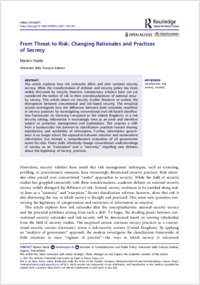From threat to risk : changing rationales and practices of secrecy
- Heide, Marlen Istituto di comunicazione e politiche pubbliche (ICPP), Facoltà di comunicazione, cultura e società, Università della Svizzera italiana, Svizzera
-
07.07.2021
Published in:
- Public integrity. - Routledge. - 2021, p. 13
English
This article explores how risk rationales affect and alter national security secrecy. While the transformation of defense and security policy has been widely discussed by security theorists, transparency scholars have not yet considered the notion of risk in their conceptualizations of national security secrecy. This article draws on security studies literature to outline the divergences between conventional and risk-based security. The empirical section investigates how the difference between both rationales manifests in secrecy practices by investigating conventional and risk-based classification frameworks (in Germany compared to the United Kingdom). In a risk security setting, information is increasingly seen as an asset and therefore subject to proactive management and exploitation. This requires a shift from a bureaucratic risk aversion in classification practices toward sharing, exploitation, and availability of information. Further, information governance is no longer about the separation between sensitive and nonsensitive information, but instead a comprehensive evaluation of all government assets for risks. These shifts ultimately change conventional understandings of secrecy as an “exemption” and a “necessity,” impelling new debates about the legitimacy of secrecy practices.
- Language
-
- English
- Classification
- Information, communication and media sciences
- License
- Open access status
- hybrid
- Identifiers
-
- RERO DOC 333708
- DOI 10.1080/10999922.2021.1932144
- ARK ark:/12658/srd1319235
- Persistent URL
- https://n2t.net/ark:/12658/srd1319235
Statistics
Document views: 222
File downloads:
- Texte intégral: 219
